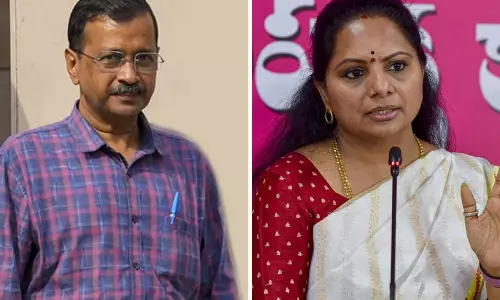
When citizenship scrutiny goes nationwide
text_fieldsUnion home minister Amit Shah stated in Rajya Sabha on Wednesday that the National Register of Citizens (NRC), the exercise to establish that every one living in this great Indian nation is truly Indian, will be extended nationwide. The minister informed that a new list of citizens for the entire country will be prepared including in Assam where NRC list has been prepared. He also said that a new Citizenship Bill will be introduced that provides for granting Indian citizenship to people from neighbouring countries Pakistan, Bangladesh and Afghanistan, except Muslims.
Our country, where all natives have been used to taking oath from their childhood that India is their country and all Indians are their brothers and sisters, is going to see a process where a segregation of its sons and daughters will be made between citizen and alien. This has been part of the racial agenda which the Sangh parivar has adopted from its very early days. The divisive philosophy they have advanced from their very inception is one of seeing - at their own discretion - the majority of residents in the country as friends, and terming the remainder alien and enemies within. With the machinery of power now in their hands, the ruling BJP is in an attempt to deal with such 'internal threats' one after the other. The party that viewed the administrative concepts and laws about citizenship and foreigner ever since the 2014 Lok election through the lens of communal politics, put forward a theory of foreigner-native within the country. The goal behind this is nothing but making political profit out of it. But going beyond that, the actual impact of proceeding with NRC has already been proven through the experiment in Assam. The Assam accord was signed in 1985 aiming to put an end to the bloody agitation in Assam against illegal immigrants from Bangladesh. The pact provided for treating all people who entered the state later than the cut-off date of 24 March 1971 as foreigners, and the call for NRC was raised to treat all of them as foreigners and infiltrators. However, other than giving promises during every election, the Congress realised full well that this was not easily workable and went on procrastinating its implementation.
With the BJP capturing power in Assam, the plan got a revival, driven more than anything else by the hope of identifying and expelling the lakhs of Bangladeshi Muslim immigrants scattered across the state. When the legal battle also intensified, the court itself took up the mission. The process that started in 2013 under the supervision of the Supreme Court, ended in 2019 after incurring a cost of Rs 1,600 Crore. When the final list was published in August, 19 lakh people were found to be ineligible for Indian citizenship. But when it transpired that 14 lakh people out of this were Hindus, BJP leaders, its fellow-travellers in NRC, Assam Gana Parishat (AGP) and All Assam Students Union (AASU) denounced the list. They approached the Supreme Court asking for a reconsideration of the matter. The court is going to hear all appeals in this regard together on the next 26th.
It was when Amit Shah realised that discontent would spread far in Assam, that he came out with a statement on 1st October that shocked the nation. That statement was that before NRC, a citizenship bill would be introduced that would grant Indian citizenship to all Hindu, Sikh, Jain, Buddhist and Chrisitan refugees. A minister who had taken oath in the name of the constitution that guarantee equal rights to all regardless of caste, creed or colour, made a statement targeting a particular community, which laid bare the motive behind NRC and the proposed citizenship bill. The new amendment will provide for granting citizenship to people of all religious sections mentioned by the minister if they have entered the country before 31 December 2014, even without any documents. To this end, the union government had made amendments in 2015 and 2016 in the Passports Act and the Foreigners Act. That is why, Congress MP Naseer Hussain asked in parliament whether all people, excluding only Muslims, will be included in NRC. In his reply, the home minister made it clear that any particular community based on religion will not be denied entry in the citizenship register. But what he didn't say was the discrimination patently existing in the citizenship bill.
A complaint has already been raised by Janata Dall (U) Prashant Kishor that the government did not consult the chief ministers about entering the respective states and conducting a citizenship survey. He also reminded that 55 per cent of the country's population live in 15 states that are ruled by non-BJP governments. Not for nothing did West Bengal chief minister Mamata Banerjee hit out saying NRC will not work in West Bengal. Political scientists also point out that there is no clear blueprint with the Centre or the ruling party about the methodology of NCR or its follow up. But even amidst such confusion the BJP is moving forward with the certainty that the proposed plan will succeed in dividing the country along racial-communal lines through which the party can reap its political dividends.























